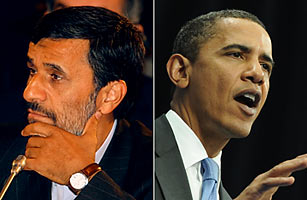
Iranian President Mahmoud Ahmadinejad, left, and U.S. President Barack Obama
The leaders of the G-8 countries meeting in the Italian mountain town of L'Aquila issued on July 8 an unusually tough statement on Iran's postelection crackdown, calling on the regime to respect the rule of law and human rights. But when it came to Tehran's nuclear program, which President Barack Obama sees as the overriding strategic issue between the U.S. and Iran, the leaders struck a milder tone, urging negotiations and underscoring Iran's rights to a civilian nuclear program. It was the clearest indication yet that despite the postelection violence in Iran, Obama intends to stick to his strategy of offering carrots before sticks for handling Iran's nuclear ambitions.
Top U.S. aides tried to convince the Western media that the G-8 statement's section on nuclear issues had been tough on Iran. In a conference call with reporters on July 8, Under Secretary of State William Burns said the document stressed "the sense of urgency that I think all eight leaders feel about the nuclear issue" and "the deep concern about Iran's continued failure to meet its international obligations."
But on the nuclear issue, the statement spent more time offering Iran respectful reassurance than making urgent declarations of concern over its intentions. "We remain committed to finding a diplomatic solution to the issue of Iran's nuclear program," the statement said, conspicuously avoiding threatening any escalation of pressure on Tehran, at least for now. "We sincerely hope that Iran will seize this opportunity to give diplomacy a chance to find a negotiated solution to the nuclear issue," the leaders said. The statement underscores Iran's right to a civilian nuclear-energy program, which is what the Iranians claim to be pursuing; Western nations suspect that its energy program provides cover for a plan to build nuclear weapons. "We recognize that Iran has the right to a civilian nuclear programme, but that comes with the responsibility to restore confidence in the exclusively peaceful nature of its nuclear activities," the G-8 statement said. In a muted indication of what another U.S. official on the conference call described as the forum's "impatience," the G-8 leaders said they would review the situation come September.
Even if the text of the statement is hard to reconcile with the White House spin, it is perfectly consistent with the approach Obama has laid out for what he says is his effort to prevent Iran from becoming a nuclear power. The Administration is offering Tehran unconditional talks on any subject, including Iran's nuclear program, and dangling the possibility of normalized relations, increased foreign investment and other incentives to get Iran to the table. But it is also threatening eventual tough sanctions if Iran refuses to bring its nuclear program into compliance with international treaty obligations. Secretary of State Hillary Clinton has said that the U.S. could impose "crippling" sanctions come this fall if there is no progress.
Some of Obama's G-8 peers, however, are not as patient. French President Nicolas Sarkozy would have preferred the statement to warn of intensified pressure if talks didn't get going, and said later on July 8, "We made an effort to agree not to strengthen sanctions straightaway in order to bring everyone on board." The British, too, would have preferred a tougher warning of the consequences that would follow an Iranian rejection of talks. White House officials, however, insisted that there was no difference between the U.S., Britain and France on the issue. It remains unclear whether Obama accepted the softer language because he wants to give Iran extra time to talk or because it was the most he could get out of Russia.
Whether by choice or necessity, Obama's policy toward Tehran has remained remarkably consistent despite the turmoil in Iran over the past month. Unfortunately for him, so have the positions of the other key players. After initially accepting the offer of nuclear talks between the U.S. and its allies in April, Iran has stalled, and thus far shows no sign of meaningful engagement. Russia and China, which are pushing for talks, nonetheless show no willingness to toughen sanctions if Iran doesn't bring its nuclear program back into compliance with its international commitments. Without their support, the West would have a difficult time imposing sanctions that would, in fact, cripple Iran. Between now and September, something will have to give, either in Washington, Moscow or Tehran.